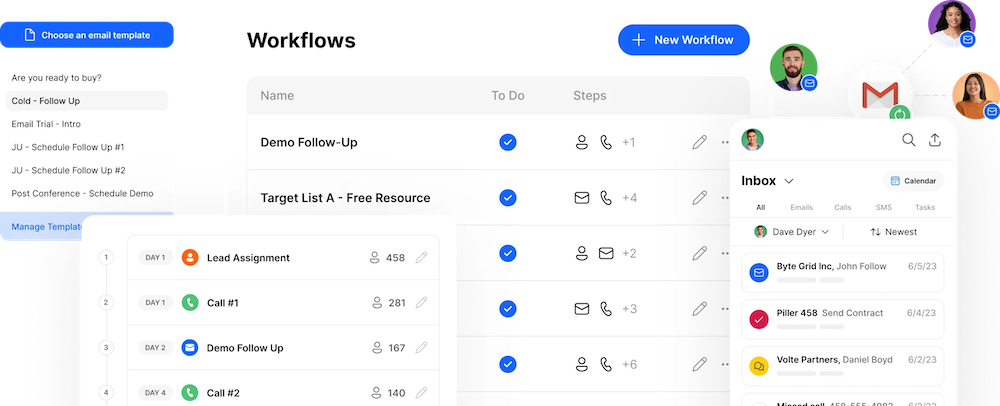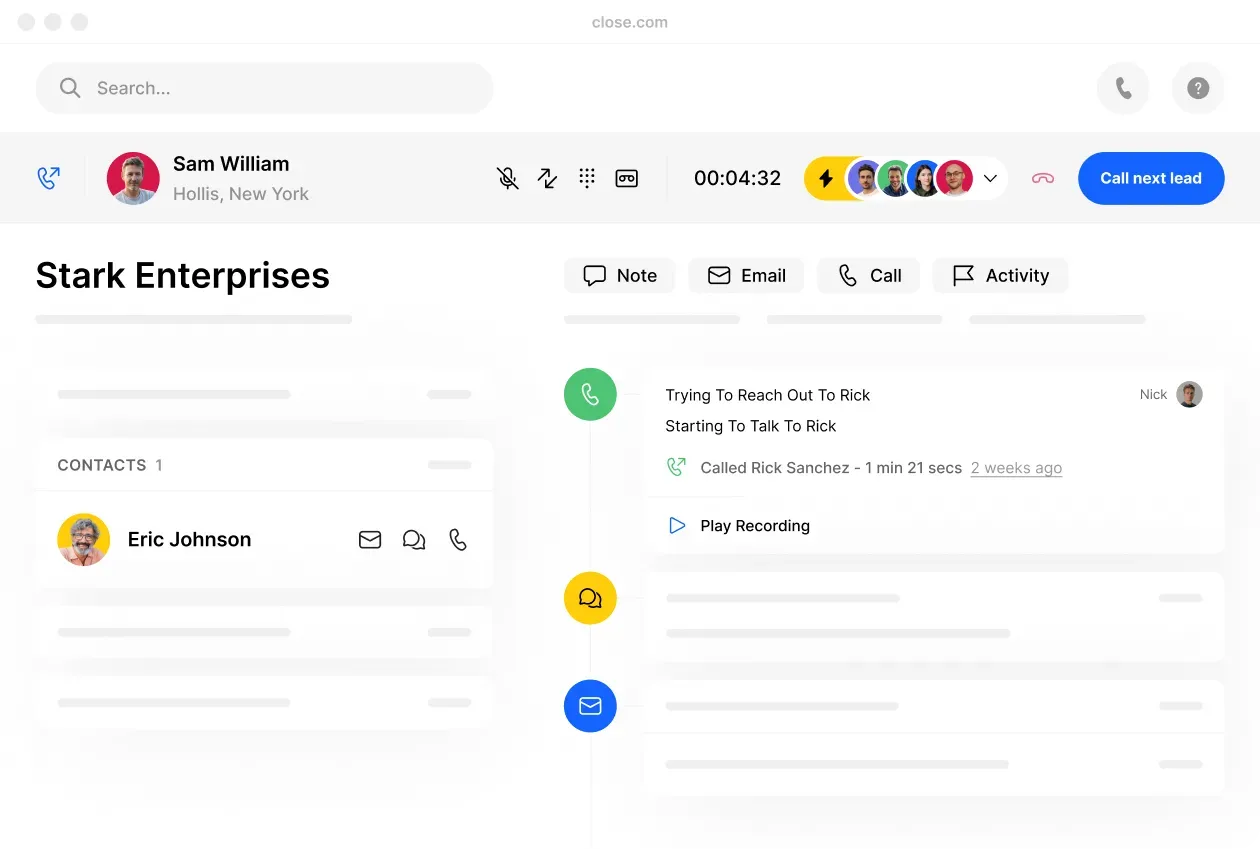
Ok, your SaaS company is going up-market. As enterprise sales are around the corner, you’re thinking, “What’s next?” First, say bye to short sales games and gear up for longer marathons. Second, you need to learn corporate sales strategies to close those giants like a pro.
Enterprise sales can be a super profitable way to grow your SaaS business. One- or two-year contracts (often paid upfront), multiple users, your product paved into the corporate tech stack, and the prestige those massive brands carry.
But hold on. You really need to know what you’re getting yourself into when selling your product to an enterprise. Especially these days, when the SaaS industry is competitive as hell.
But first, let’s start with some basics, like what enterprise SaaS sales is.
What, Exactly, Is Enterprise SaaS Sales?
Often, you’ll have to craft more customized projects for those big orgs, meet strict privacy and security obligations, and show a clear ROI.
You’ll be dealing with a lot of stakeholders, and each has to hear a slightly different story to get on your side. Sales cycles are long and might get daunting, but when you finally close deals, expect 6- to 8-figure contract value and a lucrative commission.
In enterprise sales, you’ll often talk to executives, VPs, and C-suite folks and spend a lot of time with them, nurturing those relationships. Yeah, those are the people with big budgets and big problems to solve. But don’t forget about stakeholders that seem less influential or important. Build relationships no matter the title to avoid any surprises down the road.
What will help you in corporate sales is a ton of research on all the stakeholders involved, being focused on delivering value, and being hyper-personalized in anything you communicate. You heard that right—no generic pitches.
What Skills Do You Need for Enterprise Sales?
If you want to be in the big enterprise game, you have to:
- Know how to build long-term relationships with prospects that fall into an ideal customer profile (ICP).
- Stay patient no matter what roadblocks you face along this long way.
- Effectively manage the sales pipeline with sales tools (e.g., CRM, sales intelligence, sales acceleration, and more).
- Use sales strategies and be able to think long- and short-term.
- Have a lot of self-awareness and be able to spot red flags before they smash your deal.
- Have active listening skills, stay curious, and be great at asking the right questions at the right time.
- Manage all the stakeholders and track everything with your CRM.
You’ll spend a lot of your time setting meetings, doing meetings, preparing for meetings, and following up after meetings. Knowing how to lead those meetings and stay confident is what will help you push the deal forward.
A Common Misconception When Doing SaaS Enterprise Sales
If you think about enterprise sales, you might think about selling to IBM, Coca Cola or Procter & Gamble. Stop for a moment. In any of those cases, you’re still selling to folks who work there. Don’t get misled by big logos—stay human and be really helpful to people working in those big orgs.
“Part of why enterprise sales are harder is because selling to one human is difficult.
You can’t just have one pitch that is like: Here’s why IBM will benefit from our technology. You need to understand that you need to sell on three levels.
You need to sell to the person first and foremost, and most importantly. Then you need to sell to their team or department, their group, and their tribe within the organization. Only then do you sell to the overall abstract of the company organization.”
“People buy software from people. If you can’t build that relationship and trust from the first interaction, closing a deal becomes an uphill battle.”
Alright, that sounds right. But of course, with enterprise sales, there are some differences compared to self-service or a transactional sales model.
Check them in the next section.
Enterprise SaaS Sales Model Vs. Self-service Vs. Transactional models: What Is the Difference?
As a sales rep, you have to know all the differences between various sales models. See them below.
Enterprise SaaS Sales Vs. Self-service Vs. Transactional Models:
When we talk about the key difference between SaaS sales and non-SaaS sales (such as pharma, real estate, or retail) it’s mostly about the tangibility of the service you’re selling.
In the case of non-SaaS, you’ll be selling tangible products that require more business travel. Often, instead of subscribers, you’ll have one-time buyers.
9 Strategies to Close More Enterprise SaaS Deals
With all the fundamentals of SaaS enterprise sales covered, let’s get to those nine strategies that will help you close those corporate deals.
1. Be Prepared for a Longer Sales Cycle
Yeah, when we talk about high stakes, we talk about long sales cycles. Your corporate prospects will need a lot of time to get convinced they should invest in your SaaS product.
The bigger the investment, the more risk involved, too. By identifying a timeline and setting yourself milestones, you’ll estimate how long it will take to get all prospects’ hands on board with what you offer.
This is particularly pronounced when engaged in prospecting for SaaS.
A good CRM will be your friend here—you’ll get control over the whole deal, organize your sales process and keep everything in one place. Remember to document everything in your CRM, like when and to whom you’ve done a product demo, for example.
"I would recommend getting a CRM that can grow in scale with your business because the last thing someone wants to do who's trying to close more SaaS enterprise deals is close a ton of enterprise deals and then not have the CRM be able to keep up with their demand or what they're trying to do.”
2. Create a Hyper-Targeted Lead List
With a lot of stakeholders in a deal, things might get messy. That’s why you should support yourself with a very specific list of people you’ll be reaching out to.
Say you’re managing a deal with a big investment bank. You already know that there are managers who are your internal champions and root for you, but you haven’t established a relationship with executives yet.
 |
If you want to make sure you include every exec-level person from that bank, create a targeted list in your CRM and filter all the titles that you want to reach with your workflow and automated templates.
“When you create a smart view in your CRM, you're able to take this hyper-targeted list and just almost automate the whole process when it comes to using our power dialer, bulk emailing, or enrolling this entire list into a workflow and just waiting for them to respond back from the workflow."
 |
Email workflows will save you a lot of time as you won’t have to muddle through every single contact individually. They also help you be more tactical about your outreach.
Here’s a hands-on experience from Dan Gower:
“The best way to connect with multiple stakeholders and get more buy-in is to diversify your outreach. That means creating workflows for different departments and seniority levels.
It also means creating different types of workflows that go beyond cold outreach.
For example, you can create a workflow to loop in other (higher) stakeholders—not necessarily asking them for anything, just emailing them to keep them in the loop about the conversations you've been having with their company.”
3. Find the Decision-Makers But Don’t Underestimate Gatekeepers
In enterprise sales, you rarely start right off the bat with decision-makers. First, you bump into interns, executive assistants, receptionists, or other administrative personas also called gatekeepers.
If you don’t get those people on your side first, chances are you won’t see decision-makers, ever. So start building relationships with gatekeepers, ask them relevant questions, be helpful, and respect their time.
Remember that those folks just want to do their job, they’re busy, and all they care about is keeping their jobs. If you convince them that what you bring to the table will save their company’s money, boss’s time, or help them too, they’ll put you in touch with the right person.
4. Use Your CRM’s Automation to Stay on Top of the Follow-up
Yeah, we all know how daunting this might be to manually put all the contacts in the system, send emails, and then transfer this data over to other tools you use.
Here, you should use CRM automation to offload this from your plate so you can focus on nurturing the relationship with your potential customers and keeping them engaged.
Say you’d like to send a follow-up email after a meeting with your prospects. But you want to create two different versions, one for execs and the other for managers with personalized value propositions for each. You can set filters like location, time zone, and activity type.
Or say you’d like to send a contract outline. You should be able to integrate your CRM with DocuSign, DocSales, Signable, or other contract tools to streamline the whole process.
In general, because of the length of the process, there will be a lot of moving parts and stuff happening. Store your entire interaction history in your CRM, so it’s you who controls the entire process.
 |
5. Find (and Empower) Your Advocates
The golden rule in enterprise-level sales is to convince all of the stakeholders to go with what you sell. So if you bump into a person that said “yes” to your product, no matter if they’re on the exec or intern level, use this opportunity to keep the ball rolling.
Instead of thinking that the deal is yours, think about how your advocate can actually root for your product among their colleagues. This is also your opportunity to ask for advice on how to deal with others, and how to give them value. This will make this person feel heard and respected so you score even more points in the end.
When your internal champion brings, say a VP, make sure to ask this new person questions, identify if they’re decision-makers and what are their challenges and priorities. Help them to connect your SaaS solution to those challenges and priorities so they can advocate your software further.
6. Test Different Pricing Models and Structures
Enterprise sales tend to be less sensitive to pricing but remember that when closing high-value deals, the corporate stakeholders still need to get value from the deal.
Check what type of add-ons or custom solutions the prospect needs. Gather all the needs when it comes to integrations and adjust the pricing accordingly.
You’ll be talking about discounts at some point. Use this chance to offer them an end-of-year promotion, waive some of the fees or just offer something extra. Exchange those “extras” for an annual contract and pass all the information to the account executive so they can work on the upsells in the future.
7. Proactively Manage the Onboarding in Trial Process or Pilot Project
The trial period is when they’ll verify how your software really works and if it solves those pain points that you promised it will.
The sooner your corporate client will get to the “AHA” moment, the sooner they’ll adopt the product. That’s your opportunity to convince them to stick with you and expand the relationship. It’s also the time to plan the account’s strategy and make notes of possible upsells in the future.
During the trial, make an intro with the account manager and connect the client with customer success, so they schedule a training session. The worst thing is to leave the new customer to try your software and wait. It’s time to remove all the struggles so they don’t see any red flags.
8. Use a Legal Hack to Shorten the Sales Cycle
There are no magical formulas in enterprise sales, but this little hack might actually help you slam the deal faster.
Ask your contact if they’ve made a similar software purchase before and if they can share the contracts used for purchasing that was already approved by the legal department.
Instead of writing a new contract that will take ages for their legal department to review, you get an option to use a contract that’s been approved in the past. This will save you a lot of time going back and forth between your and their lawyers.
Of course, you’ll need to adjust details like pricing, timelines, scope, and all that stuff, but you already have a foot in the door and a guarantee they’re ok with the document.
9. Learn How and When to Say “No” in Enterprise Sales
This might sound counterintuitive—all in all, you want to sell to those giant companies, right? But learning when to say “no” is critical if you don’t want to overpromise, derail your product roadmap, or just commit to something that won’t bring you profit in the long run.
Our CEO, Steli has a golden nugget from his experience to share:
"Enterprise prospects will want you to bend and do some customization and do some things that are not quite yet part of the roadmap.
You need to be very careful what exceptions you make because what I see again and again and again is a deadly sin in enterprise sales, is companies, especially startups, making these “exceptions” that end up completely altering the path of where you’re going and with that altering, your ultimate destination as a business, and a lot of times not a good destination.”
If you make any exceptions, make sure they make sense in the long-term game. And believe us, many SaaS sales reps were taken by enterprise prospects saying they won’t buy unless you build this or that feature. Guess what? Often the same folks ended up buying this SaaS product anyways.
Other Details to Keep in Mind When Working on Enterprise SaaS Deals
Alright, now you have almost everything. But we have a bunch of tiny but still important aspects of enterprise sales. Check them to be ahead in the enterprise game.
- Enterprises are super careful about security and all those internal compliance policies. If they think your software doesn’t give them the option to stay compliant or you miss out on this one security certificate, it may kill your deal. Come prepared and back yourself up with your legal department's advice.
- Enterprise customers want control over users and data. It might happen they’ll request an on-premises setup of your software. Be prepared to deal with it. Sometimes it will be a matter of hosting user data in a specific location, sometimes they’ll require to have everything “on their end.”
- Enterprise stakeholders will try to negotiate the deal and change conditions. Don’t fall into the trap of making too many exceptions, accepting that one more clause, and sealing a deal that brings just monthly recurring revenue (MRR). Ensure your effort paves the way for your software to stay in their stack for years to come.
Start Using These Enterprise SaaS Strategies– But Don’t Forget You’re Selling to People
Enterprise sales may sound tough at first, but this is also an exciting territory to develop your skills as a sales manager. Test out those sales strategies that feel right for your situation and don’t give up after being rejected once—remember the high stakes, high-risk thing?
There is actually one more thing we want to tell you. Although you’re a much smaller business than the one you’re trying to sell to, it doesn’t mean you’re irrelevant. Your startup is moving faster than those giants, you have great technology that solves real issues. Don’t forget that.










